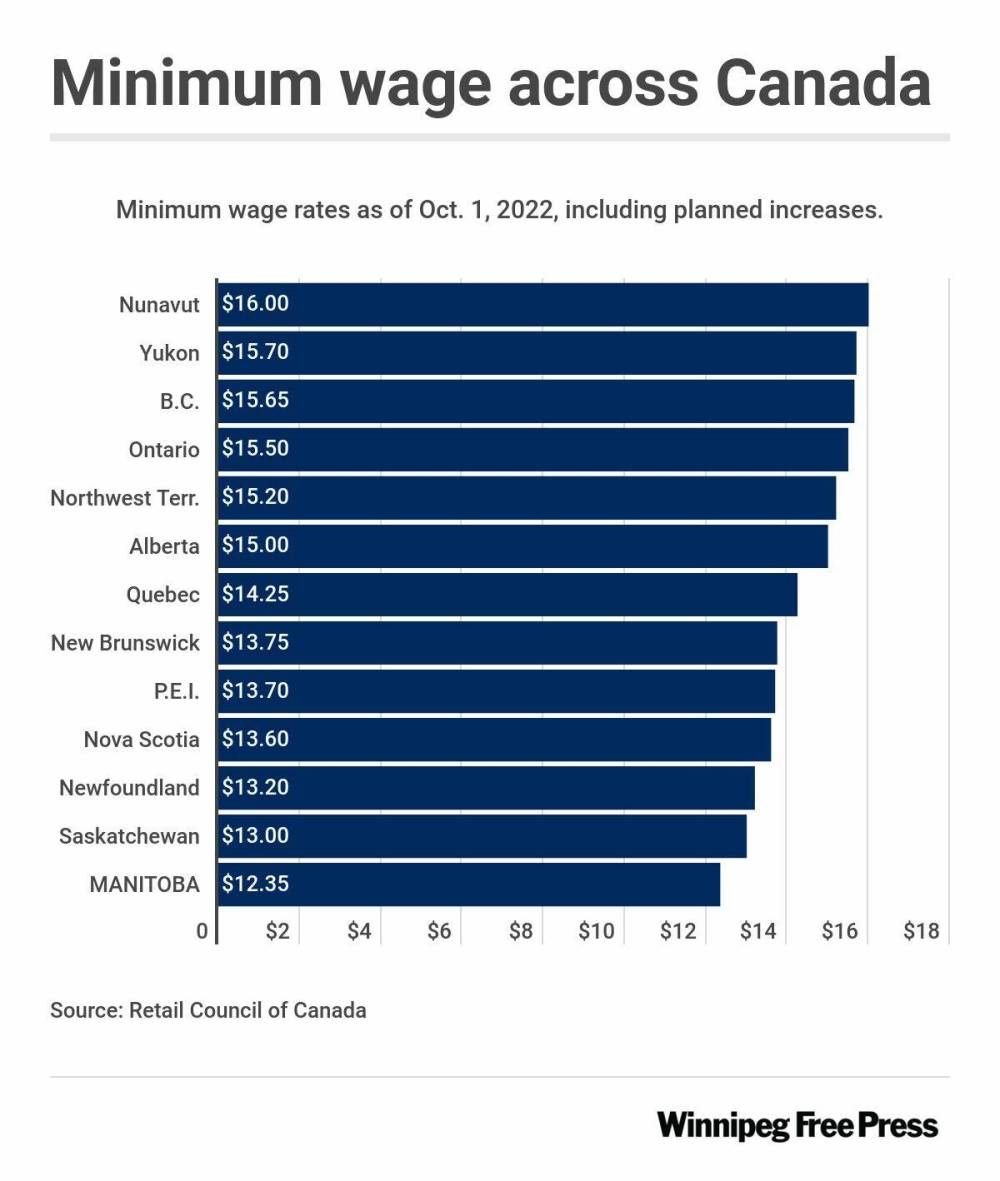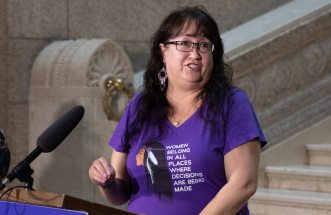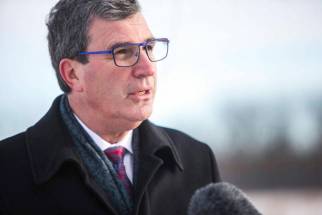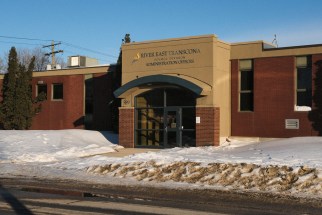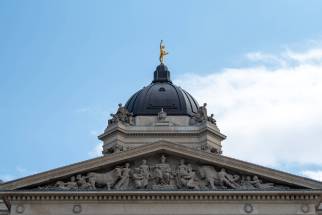Province getting ready to raise minimum wage Tory bill sets conditions to remove inflation-tied restraints, prevent Manitobans from ignominy of earning lowest rate in Canada
Read this article for free:
or
Already have an account? Log in here »
To continue reading, please subscribe:
Monthly Digital Subscription
$1 per week for 24 weeks*
- Enjoy unlimited reading on winnipegfreepress.com
- Read the E-Edition, our digital replica newspaper
- Access News Break, our award-winning app
- Play interactive puzzles
*Billed as $4.00 plus GST every four weeks. After 24 weeks, price increases to the regular rate of $19.95 plus GST every four weeks. Offer available to new and qualified returning subscribers only. Cancel any time.
Monthly Digital Subscription
$4.99/week*
- Enjoy unlimited reading on winnipegfreepress.com
- Read the E-Edition, our digital replica newspaper
- Access News Break, our award-winning app
- Play interactive puzzles
*Billed as $19.95 plus GST every four weeks. Cancel any time.
To continue reading, please subscribe:
Add Free Press access to your Brandon Sun subscription for only an additional
$1 for the first 4 weeks*
*Your next subscription payment will increase by $1.00 and you will be charged $16.99 plus GST for four weeks. After four weeks, your payment will increase to $23.99 plus GST every four weeks.
Read unlimited articles for free today:
or
Already have an account? Log in here »
Hey there, time traveller!
This article was published 30/05/2022 (1375 days ago), so information in it may no longer be current.
With Manitoba’s minimum wage on target to be the lowest in Canada this fall, the Progressive Conservatives introduced legislation Monday overriding a 2017 bill that caps increases at the rate of inflation.
Labour Minister Reg Helwer introduced Bill 44 — the Employment Standards Code Amendment Act (Minimum Wage) — that allows cabinet to raise minimum wage above the Consumer Price Index when the rate of inflation exceeds five per cent in the first three months of that year.
The increase must be made within 30 days of taking effect and the effective date must be within the period of Oct. 1 to Dec. 31 of the applicable year, according to the bill that’s expected to pass by the time the house rises for the summer late Wednesday.
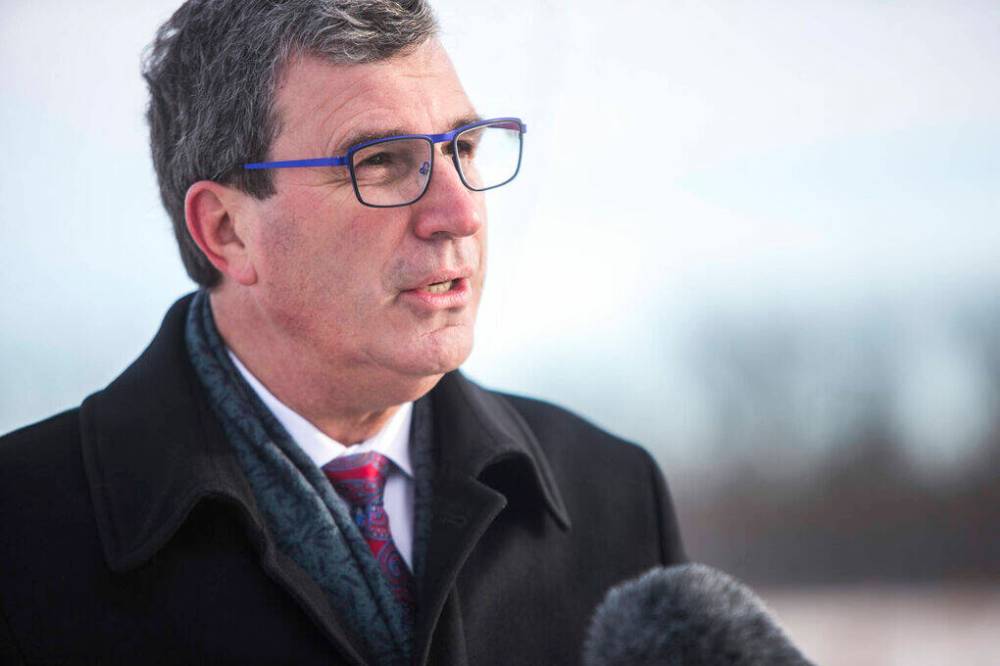
During question period and a scrum with reporters afterward, Helwer wouldn’t say Monday what the minimum wage will be in October or commit to increasing it.
It is is now $11.95 per hour and set to increase 40 cents on Oct. 1 to $12.35, making it the lowest in Canada, as Saskatchewan will be increasing its minimum wage to $13.
Helwer told reporters Monday that these are “very uncertain times,” and his government will be consulting with business and labour groups about what the wage should be.
The bill provides a workaround to the Minimum Wage Indexation Act (Employment Standards Code Amended) passed five years ago under the reign of then-premier Brian Pallister, whose austerity measures have kept a lid on the minimum wage.
Until Friday, Premier Heather Stefanson’s government had defended the legislation and its predictability, even after Manitobans received a five-cent minimum-wage increase on Oct. 1 based on last year’s rate of inflation while trying to cope with soaring prices resulting from a 30-year high inflation rate.
After meeting with her western counterparts at a premiers conference last week, Stefanson acknowledged that Manitoba needs to remain “competitive” with other provinces and that it had “somewhat gotten behind.”
Business and labour groups said they were looking forward to being consulted on what Manitoba’s minimum wage should be.
“We get that this year’s been a bit unique in terms of the impact of inflation, but it’s also had an impact on small businesses,” said Chuck Davidson, president and chief executive officer of the Manitoba Chambers of Commerce.
“The other reality, too, is that I’ve yet to talk to a business owner that’s paying minimum wage; the demand for workers is such that everybody is above and beyond minimum wage.”
– Chuck Davidson, president and chief executive officer of the Manitoba Chambers of Commerce
“And that’s the concern — that it’s typically going to be small businesses that are impacted by any kind of increase like this,” Davidson said. “The other reality, too, is that I’ve yet to talk to a business owner that’s paying minimum wage; the demand for workers is such that everybody is above and beyond minimum wage.
“I would like to see what the impact is and how many people are actually impacted by minimum wage right now.”
Monday’s bill was welcomed by labour and income-equality advocates.
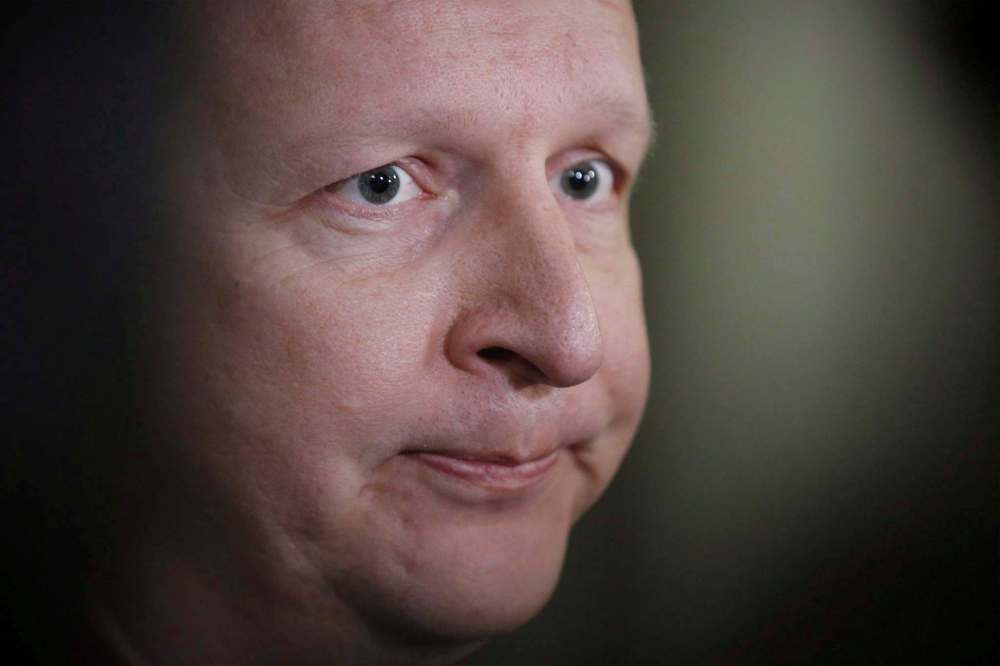
“I’m glad that government is now opening the door to do the right thing, but they haven’t done the right thing yet,” said Kevin Rebeck, head of the Manitoba Federation of Labour, which called for a $16 hourly minimum wage two years ago.
“We’re calling for minimum wage to be a living wage,” he said Monday. “We’ll be pushing hard through the consultation to call for government to do the right thing… our working Manitobans deserve it and are certainly facing lots of increases at the pumps and at the grocery stores. Minimum-wage workers are hit the hardest.”
University of Manitoba economic professor Jesse Hajer said an above-inflation increase is needed for Manitoba rise above having the lowest minimum wage in Canada.
“We’re not going to stand in the way of working folks of getting an increase.”
– NDP Leader Wab Kinew
“It is now indexed, but tied to a relatively low amount, after a lack of increases to keep pace with inflation,” Hajer said. “With inflation at 7.5 per cent year-over-year, minimum-wage workers will be struggling even more now. The reality is, though, that a substantial increase will be required to make up for these losses and allow minimum-wage workers to come closer to meeting their basic needs.”
NDP Leader Wab Kinew said the Tory government should have already consulted with business and labour and arrived at an appropriate rate, given the rising cost of living and publicly lauding front-line workers throughout the pandemic.
While the Opposition is pushing for a “substantial” increase, it plans to support the government bill so it passes before the house rises, he said.
“We’re not going to stand in the way of working folks of getting an increase,” said Kinew.
Liberal Leader Dougald Lamont said the PCs’ “about face” on limiting minimum-wage increases to last year’s rate of inflation wasn’t motivated by a desire to help people earning that amount.
“A higher minimum wage is essential to attract and keep workers and will boost the economy, but it’s certainly not ‘aid,’” Lamont, who tested positive for COVID-19 and is working remotely, said in a prepared statement Monday.
“It’s proper pay for work done.”
carol.sanders@freepress.mb.ca

Carol Sanders
Legislature reporter
Carol Sanders is a reporter at the Free Press legislature bureau. The former general assignment reporter and copy editor joined the paper in 1997. Read more about Carol.
Every piece of reporting Carol produces is reviewed by an editing team before it is posted online or published in print — part of the Free Press‘s tradition, since 1872, of producing reliable independent journalism. Read more about Free Press’s history and mandate, and learn how our newsroom operates.
Our newsroom depends on a growing audience of readers to power our journalism. If you are not a paid reader, please consider becoming a subscriber.
Our newsroom depends on its audience of readers to power our journalism. Thank you for your support.

